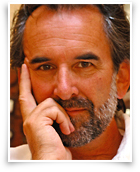
Richard Harvey
connecting psychotherapy and spiritual growth for human awakening
Therapy and Politics
In 1968 I was a pupil at Hele’s School in Exeter. An angry, energetic boy called Steve used to invite me to the CND demos in Princesshay. I was idealistic and laid-back. I never went. He liked Bob Dylan for the protest. I liked him for the poetry and the feeling. I was interested in yoga and meditation. He was a pragmatist and an atheist. He wanted to change the world. I wanted to change myself. We stood for two sides of an argument.
When the personal growth movement made such an impact on so many people’s lives in the late Seventies, one of the criticisms was, understandably, that the people in it were turning their backs on political and social issues because they lacked social awareness and a social conscience.
In spite of feminist therapy, particularly the Women’s Centre in London and the increasing number of therapy and counselling publications which addressed the issue of social awareness, reflecting the need for individual therapy and growth to be seen in a wider socio-political context, this criticism may still be heard today.
R D Laing said in The Politics of Experience in 1967:
We are born into a world where alienation awaits us. We are potentially persons, but are in an alienated state, and this state is not simply a natural system. Alienation as our present destiny is achieved only by outrageous violence perpetrated by human beings on human beings.
So what is the relation between therapy/personal growth and politics/social awareness?
Obviously there are people involved in politics with a highly developed social awareness who have no awareness of their inner process whatsoever, as there are people involved in their personal growth to the exclusion of all else, including the person sitting next to them. However, these are extremes.
I believe the answer to this question is important and that it lies in balance. How effective are you in the political forum if you are filled with violence, anger and prejudice against the injustice of people who may be motivated by exactly the same kinds of thoughts and emotions as you have? How aware is the work of personal growth if it produces self-aware individuals with expanded, responsive hears and minds who don’t give a damn about social injustice, political bigotry and patriarchal dominance?
The two areas of therapy and politics need to inform each other. The therapy people need to use their personal clarity, power and expansiveness in political arenas. The political people need to bring their wider awareness into the growth movement.
The “new therapies” (still an unfortunate term I think) are not for ill people. So-called “mental illness” must be seen in the light of social conditioning anyway. Growth groups could be a place where politically-active people came to let go of the imbalance of emotions they experience about political issues. With new clarity their thinking and work may become more direct and more effective.
But I am not saying that these issues should not be used as catalysts to offload deeper, long-held anger. As a psychotherapist and a leader of personal growth groups I believe it would be quite wrong if I used a personal growth buzz phrase like “personal responsibility” to imply that it is someone’s fault that they are in their life situation with their individual mix of problems, dilemmas and personal issues. The issues are always much more complex. Prejudice, selfishness, violence, elitism, vindictiveness, power-hunger all have their emotionally-driven motivations. Where are the political people who will explore their emotions? Where are the personal growth people who will truly expand their consciousness?
If I met Steve today I would be curious to see where his route led him. We were both idealists. He thought he was right and the world was wrong. I thought the world was alright and I was wrong. Somehow, between us, I guess we had something of an answer.
Share this article
This article was published in Exeter Flying Post, No 208, 1990.